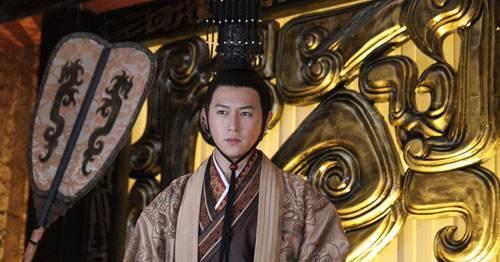Emperor Wen of Han Liu Heng, the fifth emperor of the Western Han Dynasty, the fourth son of Liu Bang, and his mother was Bo Ji. He once personally tasted medicine for his mother, which was quite filial and was the protagonist of the soup medicine in "Twenty-Four Filial Pieties". After Emperor Wen of Han ascended the throne, taking the reason for the fall of the Qin Dynasty as a lesson, he was well aware of the significance of the people's lives to social stability, so he abolished corporal punishment and issued an edict to abolish the world's land rent. The implementation of these policies enabled the economy of the Han Dynasty to develop, culture and education to flourish, and national strength to become stronger and stronger.

In addition, Emperor Wen of Han was also very frugal, and during his reign, he pursued Huang Lao's policy of "ruling by doing nothing". How frugal is he? According to the history book Zizhi Tongjian, Emperor Wen of Han reigned for 23 years without adding a single new piece of clothing; did not raise an extra horse or dog; and did not expand a palace. He "buckles" not only to himself, but also to his own women. Empress Dou, as the mother of a country, could only wear clothes made of coarse cloth every day, and Lady Shen, the favorite concubine of Emperor Wen of Han, could not wear a skirt that mopped the floor. Ordinary rich people in the folk are better dressed than the two of them.
However, such a "miserly" emperor gave the male pet a golden mountain! This male favorite was Deng Tong, who was deeply favored and loved by Emperor Wen of Han and was jokingly called the "God of Money". The acquaintance of the two is very legendary.
One night, Emperor Wen of Han dreamed that he had flown into the sky, but he fell halfway down, only to be caught by a yellow-headed Lang Jun, who helped him fly high into the air. After he woke up, he immediately looked for the yellow-headed Langjun in the palace. In the end, it was found that Deng Tong looked exactly like the person in the dream, and his name was similar to that of Deng tian, and Emperor Wen of Han thought that this was an auspicious omen, so he greatly rewarded Deng Tong. After that, Emperor Wen of Han's favor for him rose to a high level.
One day, Emperor Wen of Han asked a warlock to show Deng Tong a picture. After seeing his face, the warlock said bluntly, "Dr. Deng will die of poverty in the future." The emperor was very unhappy after hearing this, and indignantly said to Deng Tong, "If you want to make you rich, why is it so difficult?" After saying this, he ordered that the copper mountain in Yandao County, Shu County, be given to Deng Tong and allowed to mint money. Because the money minted by Deng Tong was of good quality, it was called "Deng's Money" by the people of the time and was widely circulated in the Han Dynasty. Since then, Deng Tongfu has been an enemy of the country.
When Emperor Wen of Han gave his male pet a golden mountain, the ministers were very puzzled, was the emperor enlightened? Or is it that the emperor is not frugal at all, and is not stingy at all about the people he loves? People don't have a definitive answer. It was not until four years after the death of Emperor Wen of Han that people discovered his true intention of rewarding Deng Tongjinshan.
At that time, Liu Bang's nephew Liu Hao's fief was in the State of Wu. Although the kingdom of Wu is remote, the area is rich in natural resources. Liu Hao saw the situation and had a bad heart. He gathered the outlaws of the world to mine Tongshan in Yuzhang County, and then boiled seawater for salt, so Wu Guo's money and salt were popular throughout the country, and Liu Hao's strength was getting stronger and stronger.
The relationship between Emperor Wen of Han and Liu Hao was okay at first, but later because the crown prince Liu Qi lost to Liu Hao's only son in the game of Go, Emperor Wen of Han became angry and killed Liu Hao's son with a chessboard. Liu Hao did not choose to rebel directly, but under the pretext of old illness, he no longer went to see Emperor Wen of Han. Because of the loss of reason and the strength of the State of Wu, the emperor did not pursue Liu Hao's disrespect. After Wu Qian's wanton flooding, it was bound to threaten the finances of the central government and even the security of the Han Dynasty, and Wu Guo was always a major problem. Emperor Wen of Han always wanted to develop new coins to replace Wu qian, and if the imperial court blatantly minted money, it would certainly arouse Liu Hao's vigilance.
Therefore, Emperor Wen of Han asked Deng Tong to mint money in the name of a private person, and if Liu Hao targeted Deng Tong, he could also quietly assist Deng Tong behind his back and not be discovered. This move not only increased the wealth of the male pet, made the emperor's pocket bulge, but also effectively struck the strength of the Wu state.
Unfortunately, Emperor Jingdi of Han did not grasp the bitter heart of his father, and because of hatred and greed for Deng Tong's wealth, he took away all his family property and starved him to death. Only four years after the death of Emperor Wen of Han, the State of Wu united with seven other princely states to launch a rebellion, known in history as the "Rebellion of the Seven Kingdoms of Wu and Chu".